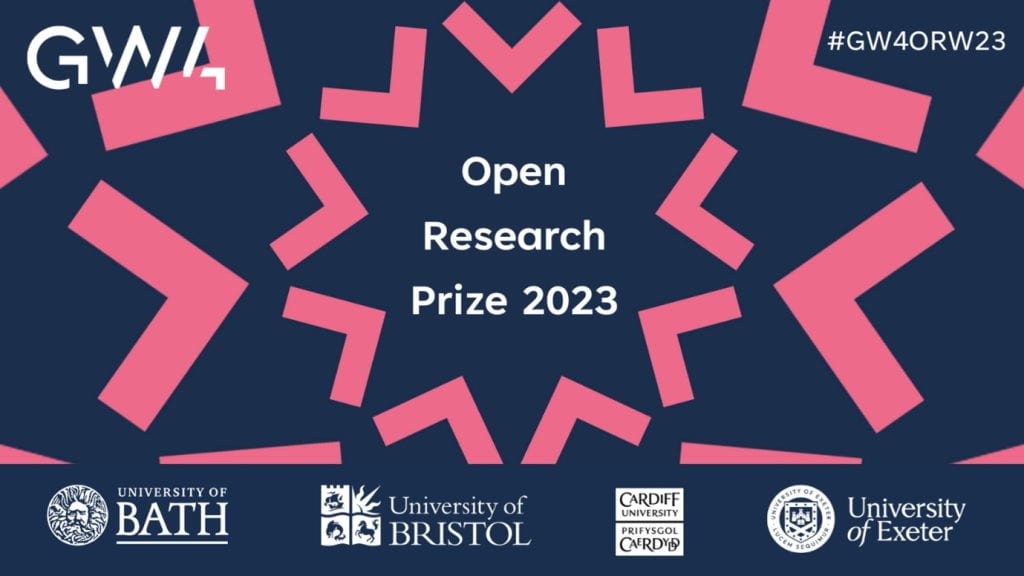By Christopher Warren, Assistant Research Support Librarian
Following straight on from January’s blog, Change is the word! In 2023, the GW4 Alliance hosted their Open Research Week at the end of November with the theme of The Theory of Change showcasing a broad range of open research practices which make research more visible, accessible, transparent and reproducible (or, Findable, Accessible, Interoperable, Reusable – FAIR).
This year GW4 opted hold a competitive award event in that week to elevate, celebrate and promote best academic practice: the GW4 Open Research Prize 2023.

Background
In 2021 the University of Bristol started our own institutional Open Research Prize, with a second event following in 2022. From the success of those, and working with our colleagues at Bath, Cardiff and Exeter as well as the GW4 team, the new GW4 Open Research Prize built on our past work and opened it out to researchers from all four institutions.
To our original two categories – Improving Quality and Widening Reach – GW4 added a prize specifically for Posters, and, with the Bristol University Press (BUP), an Early Career Publishing Prize category for ECRs writing monographs. The amounts of prize money for each category was raised as well, as well as the chance for the Publishing Prize winner to work with BUP explore publication of their doctoral thesis.
Events and awards
After an initial submission period, we invited entries short-listed to attend an afternoon online conference through Zoom, where all entries sent in a short pre-recorded case study presentation video – so there would be a level playing-field for all. Q&As were taken after each between presenter and audience. At previous UOB events we had split judging between a panel of judges and a popular vote from those attending, but here the decision on choosing winning entries was made by the audience alone (other than for the monograph prize, see below).
GW4 Open Research Prize for Widening Reach
The winning entry for Widening Reach was Matt Lloyd Jones of University of Exeter (Penryn Campus): Exploring the potential of using simulation games for engaging with sheep farmers about sheep lameness
This study codesigned a videogame with farmers and vets to identify lameness in sheep. It showed an open, involved process, increasing uptake and impact among those it benefitted. Publications from it were preregistered and published as Open Access. The data itself was published as FAIR data, in an Open repository. It demonstrated excellent Open Research practice, while being honest about the limitations and costs involved in the project.
GW4 Open Research Prize for Improving Quality
The winning entry in the Improving Quality category was a team from the University of Exeter Katie Young, Pedro Cardoso, Laura Guedemann, Rhian Hopkins with their study: Improving reproducibility and transparency of diabetes research with electronic health care records
This study took electronic health data, messy at source, and applied Open Research practices to make it reproducible and transparent. They wrote code so it could be securely shared with clinicians for validation, creating safe, clean data all in one place, that would help reduce researchers’ workload, raising quality and facilitating protocol approval. This was excellent science, showing the benefits of applying Open Research practices in a key area.
GW4 Open Research Prize for Poster submission
The winner in the Poster Prize category was Eoin Cremen of University of Bath: “The influence of AI advice on decision-making strategies in a hypothesis testing task”
The winning poster (which can be viewed here: The influence of AI advice on decision-making strategies in a hypothesis testing task) focused on how people use AI to search for health results. Focusing on ‘aches’, this looked at running a feasibility study for checking the AI-advice provided to test the diagnosis and see whether this is accurate and relevant to the information given.
GW4 Early Career Publishing Prize
The winning Publishing Prize entry was judged ahead of the event by a cross-institution panel of judges working with the BUP. This was an entirely new prize category for us, not having worked on selecting or awarding a monograph prize before.
In first place was Bristol’s own Alison Oldfield, University of Bristol: Going to the farm: A sociomaterial ethnography of autistic young people in a natural environment.
Alison’s thesis, on which her winning submission was based, can be found through the UOB Research Portal here: Thesis: Going to the farm
**Details of all taking part is available from GW4 or the School of Education blog here: GW4 Open Research Prize 2023: Winners announced!
Wrapping up
The Open Research Prize was a great day, bringing together many strands from across the Open Research Week and a chance for colleagues to celebrate and recognise each other’s achievement.
The next prize will be in the spring of 2025. Bath University, which is another of the GW4 institutions, will be taking the reins on organising this prize, but watch out for events and updates via GW4’s website or on our own Open Research pages.
Contact

Christopher Warren is an Assistant Research Support Librarian with the Research Data Service, a section of the Library Services’ Research Support Team that deals with all matters relating to Research Data Management. We’re based online and on the 1st floor of Augustine’s Courtyard. Please contact data-bris@bristol.ac.uk or lib-research-support@bristol.ac.uk for more information.
